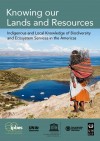
Indigenous peoples
tribal_test3.jpg

Indigenous peoples live in all regions of the world and own, occupy or use some 22% of global land area. Numbering at least 370-500 million, indigenous peoples represent the greater part of the world’s cultural diversity, and have created and speak the major share of the world’s almost 7000 languages. Many indigenous peoples continue to be confronted with marginalization, extreme poverty and other human rights violations. Through partnerships with indigenous peoples, UNESCO seeks to support them in addressing the multiple challenges they face, while acknowledging their significant role in sustaining the diversity of the world’s cultural and biological landscape.
UNESCO places the needs of indigenous peoples amongst its priority areas for response. For more information on indigenous peoples, please email indigenouspeoples(at)unesco.org
The International Day of the World's Indigenous Peoples, celebrated each year on 9 August, marks the day of the first meeting, in 1982, of the UN Working Group on Indigenous Populations of the Subcommission on the Promotion and Protection of Human Rights. Each year, UNESCO marks the celebration of the Day by sharing information on projects and activities that are relevant to the annual theme.
- 2017. Tenth Anniversary of the UN Declaration on the Rights of Indigenous Peoples
- 2016. Indigenous Peoples' Right to Education
- 2015. Post 2015 Agenda: Ensuring indigenous peoples' health and well-being"
- 2014. Bridging the gap: Implementing the rights of indigenous peoples
- 2013: Indigenous peoples building alliances: Honouring treaties, agreements and other constructive arrangements
- 2012: Indigenous Media, Empowering Indigenous Voices
UNESCO has been celebrating International Mother Language Day for nearly 20 years with the aim of preserving linguistic diversity and promoting mother tongue-based multilingual education. Linguistic diversity is increasingly threatened as more and more languages disappear. One language disappears on average every two weeks, taking with it an entire cultural and intellectual heritage.
Nevertheless, progress is being made in mother tongue-based multilingual education with growing understanding of its importance, particularly in early schooling, and more commitment to its development in public life.
On International Mother Language Day 2018, celebrated every year on 21 February, UNESCO reiterates its commitment to linguistic diversity and invites its Member States to celebrate the day in as many languages as possible as a reminder that linguistic diversity and multilingualism are essential for sustainable development.
News
- 1 of 4
- next ›









